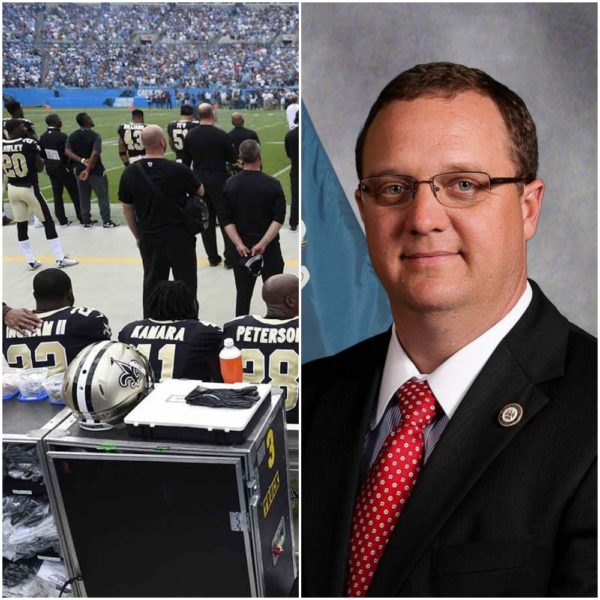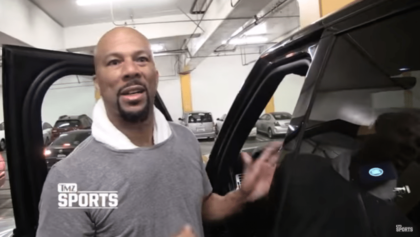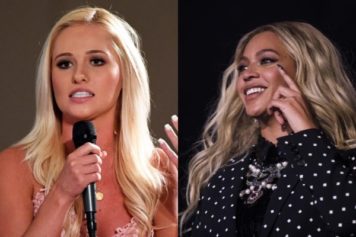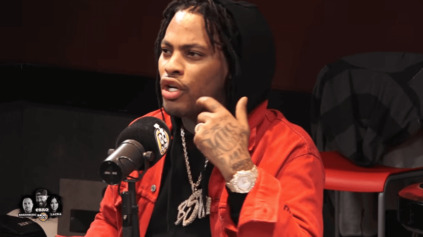
New Orleans Saints players sit during the National Anthem. Louisiana State Rep. Kenny Harvard wants to punish them and the team for said protest.
The right to protest is supposedly as American as apple pie, embedded within the First Amendment as “Congress shall make no law respecting an establishment of religion, or prohibiting the free exercise thereof; or abridging the freedom of speech, or of the press; or of the right of the people peaceably to assemble, and to petition the Government for a redress of grievances.”
But for Black Americans, the right to protest has historically been met with resistance. From terror inflicted by groups like the KKK, to that inflicted by our own government, as proven during brutal incidents like Bloody Sunday in which armed authorities assaulted protesters — including Martin Luther King Jr. and future Georgia Rep. John Lewis — as they marched to Selma.
As time has gone on the need for protests hasn’t subsided, although the tactics may have shifted a little. For some NFL players it’s meant taking it to the sidelines on game days, where the ongoing national anthem protest has drawn both praise and criticism, including voices like President Donald Trump, who has given more energy to angrily tweeting — especially about Black athletes in particular — than he’s spent, say, in being an effective leader.
Then there are figures like Louisiana State Rep. Kenny Harvard, who recently renewed his calls to cut tax breaks and millions in tax incentives for the New Orleans Saints — seemingly in retaliation to players that elected to kneel during performances of the national anthem earlier in the season.
He first floated the idea in September, issuing a statement that argued, “The very reason they have the privilege and opportunity to play professional football while being paid millions is because someone in uniform died protecting their right to do so.”
“Disrespecting our national anthem and flag in the name of social injustice is the highest form of hypocrisy. It is time the taxpayers quit subsidizing protest on big boy playgrounds,” he added.
The St. Francisville, Louisiana, native also made headlines last year, after introducing an amendment to a bill that raised the minimum age for exotic dancers in the state to 21. Harvard’s new amendment would have also required dancers to be “no more than 28 years old and weigh no more than 160 pounds.”
In a more recent interview with NPR, Harvard reasons that cutting the funding is fair game because “We’re paying the Saints a lot of money’ to entertain us — not to get off in the weeds of, you know, political discourse.” Adding, “They can do that, but do it on their own time.”
Under Harvard’s proposal, the Saint’s would lose incentives like the free rental space they currently enjoy at the Mercedes-Benz Superdome; a windfall for Saints and Pelicans owner Tom Benson. In addition to that lease, which doesn’t expire until 2025, the agreement also requires the state to pay the team for each Super Bowl that it sees. Under the current agreement, the Saints are not required to pay taxes on the state owned property.
A 2015 report from Forbes also revealed that “Over 15 years, the term of the lease, the state will pay Benson at least $198 million in increased revenue from the Superdome, $142 million in rental payments on property Benson owns, $10 million in bonuses for bringing the Super Bowl to New Orleans and $2.6 million in tax breaks.”
To date, the Saints have declined to respond, and with the Louisiana Legislature not in session, it’s unlikely to see any traction until they reconvene in 2018.
But Harvard’s comments are the type of reactionary response that Trump and many others have issued, the assumption that Black athletes should just “shut up and play” as if their voices are any less valid than that of a real estate developer and reality television star who became U.S. president.
While some NFL team owners have remained mum on the subject, others have been more vocal, including Cowboys owner Jerry Jones, who insisted in October that “There is no question the league is suffering negative effects from these protests.”
Some fans are also not impressed, including Lee Dragna, who recently filed a lawsuit against the team, essentially in protest of their protest. According to the suit, “Apparently, these players were following the lead of [former San Francisco 49ers quarterback] Colin Kaepernick by disrespecting the flag, the anthem, the USA and those who have served and are serving the USA in our military.”
Speaking with The Advocate, Dragna described the controversy as avoidable stating “The Saints created that behavior by condoning it — players should not be allowed to protest. If you sell tickets to a gaming event for entertainment, you should not be allowed to turn it political.
Often missing in this debate are the issues that Kaepernick first protested: police brutality and racial injustice. Things that Harvard sees as a thing of the past, making the players protests, at least in his mind, invalid. “Look: Slavery was however long ago, and it was a horrible thing and no one should have to go through that,” said Harvard. “But it’s time that we move on as a nation.”
Likening the anthem to a simple matter of basic decency, rather than admitting that institutional barriers still exist, he explained, “When I see a lady coming, I open a door. When I sit at the table, I take my hat off. When the national anthem plays, I stand.”
For individuals like Harvard, the perception of patriotism is more important than the actual act. Meanwhile, in his own backyard, Louisiana remains listed as one of the worst states for Black Americans, thanks in part to a crumbling justice system that sends black residents to jail at a far higher rate than their white counterparts.
Louisiana Black students also struggle against inequalities in the education system, with a report from state officials presenting the statistics: “There are a disproportionate number of African-American students enrolled in alternative education, due to expulsion and suspension. African-American students are 3.25 times more likely to be expelled and 7.8 times more likely to be suspended, when compared to Caucasian students.”
Faced with these issues and more, representatives like Ted James have argued that “This is not a conversation about Saints players being political.” “This is a conversation about race” he said via NPR.
Getting to the heart of the matter, he added “ As a black man and as a black player, you are telling these athletes, ‘Go throw that ball, catch that ball, run that ball, tackle that quarterback, but you dare not say a word’ That’s a plantation mentality.”
Others have blasted the debate in general, including Louisiana Rep. C. Denise Marcelle, who took to Facebook earlier this year to write “I’m simply amazed at the number of people who are supporting Trump’s idiotic statement referencing the NFL players who are protesting by not standing up for the national anthem and the flag that he keeps disrespecting!”
Also lost in the fray has been Kaepernick’s original intent, no matter how often he’s reiterated his stance. The seemingly blackballed former quarterback began kneeling during the 2016 season after consulting with U.S. Army veteran Nate Boyer, who suggested that kneeling would be an appropriate — and respectful — manner to voice his concerns about police brutality and disproportionate punishment of African-Americans in the U.S. justice system. Instead the conversation has largely turned into a debate about the flag.
According to Kaepernick, “People don’t realize what’s really going on in this country. There are a lot of things that are going on that are unjust. People aren’t being held accountable for. And that’s something that needs to change. That’s something that this country stands for freedom, liberty and justice for all. And it’s not happening for all right now.”


